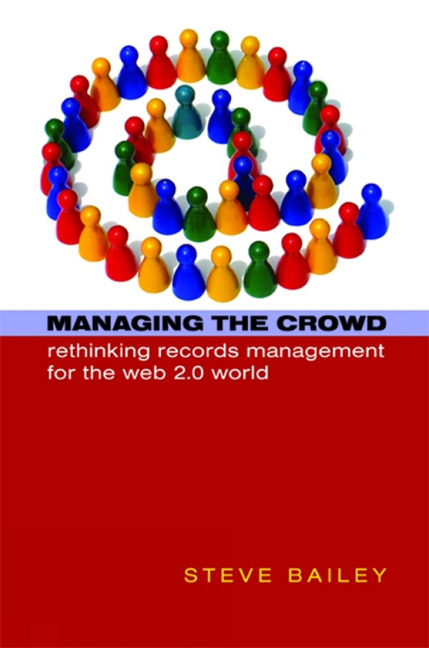Book contents
- Frontmatter
- Dedication
- Contents
- Foreword
- Preface
- Part 1 The Nature Of The Changing World
- Part 2 Is records management no longer fit for purpose?
- 5 The need for critical professional self-examination
- 6 ‘Not all information sources are records’
- 7 The centralized command and control ethos
- 8 ‘Regardless of format...’
- 9 Appraisal, retention and destruction
- 10 The problems with applying existing approaches to appraisal in the Web 2.0 world
- Part 3 Records Management.0 And The Future Of Records Management 121
- Index
5 - The need for critical professional self-examination
from Part 2 - Is records management no longer fit for purpose?
Published online by Cambridge University Press: 08 June 2018
- Frontmatter
- Dedication
- Contents
- Foreword
- Preface
- Part 1 The Nature Of The Changing World
- Part 2 Is records management no longer fit for purpose?
- 5 The need for critical professional self-examination
- 6 ‘Not all information sources are records’
- 7 The centralized command and control ethos
- 8 ‘Regardless of format...’
- 9 Appraisal, retention and destruction
- 10 The problems with applying existing approaches to appraisal in the Web 2.0 world
- Part 3 Records Management.0 And The Future Of Records Management 121
- Index
Summary
Questions addressed in this chapter
• Should we be more willing to rigorously and critically self-examine our established methodologies?
• Are the ways in which we seek to address issues such as e-mail management and compliance with the Freedom of Information Act really fit for purpose?
The importance of continued professional reinvention
Many of the principles that underpin established records management theory were formulated in, and for, another age. As the preceding chapters have illustrated, I would argue that the degree and pace of change is now such that serious questions must be asked regarding the continued validity of much of our approach – at least when it comes to how we manage the kinds of information created within the Web 2.0 world. Historically, such a process of critical self-examination does not seem to be something that we, as a profession, are particularly good at doing. Other (though admittedly not comparable) professions, such as medicine, are continually having to review, reflect and reinvent the way in which procedures are performed, both in response to the opportunities offered by new technology, but also as our understanding of the human body evolves. A strong research base, rigorous continuing professional development and continual and heavily policed professional and public scrutiny, all help to continually push boundaries, to question orthodoxy and to innovate. Even less specialist areas such as manufacturing, retail and the media find themselves forced into a continual process of professional renewal that requires them to accept and even embrace change and to try to turn it to their advantage.
Can the same be said of the records management profession? The reflex response will inevitably be to leap to our own defence and to claim that we are, indeed, a proactive, vibrant professional community that is constantly reinventing itself, its tools and its techniques to cope with changing times; but is this really the case? Approaches to record retention and appraisal will be covered in detail in a later chapter, but for now it serves to point to the fact that the way in which we think about and practise our retention schedules has not, in essence, changed for the best part of half a century.
- Type
- Chapter
- Information
- Managing the CrowdRethinking records management for the Web 2.0 world, pp. 53 - 58Publisher: FacetPrint publication year: 2008



